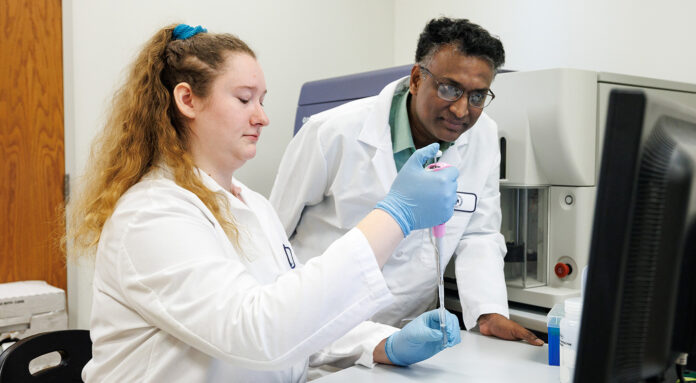SAVANNAH — Raghavan Chinnadurai, Ph.D., assistant professor in the biomedical sciences department at Mercer University School of Medicine (MUSM), received a grant from Mallinckrodt Pharmaceutical Industry through its External Collaborative Research Program. This funding will support research to help understand the mechanism of action (MOA) or how innovative cellular therapy works to reduce complications from hematopoietic stem cell transplantation. Understanding the therapy’s MOA can help optimize treatment strategies, identify potential side effects and predict patient response.
Blood and bone marrow cancers are among the leading causes of cancer-related deaths in the United States, including Georgia. Hematopoietic stem cell transplantation is the standard treatment for these patients, which involves infusing healthy blood-forming cells (hematopoietic stem cells) from a donor into the patient’s body. However, some patients experience serious complications after a stem cell transplantation, such as extensive inflammation and tissue injury known as graft-versus-host disease (GvHD).
Cellular therapy shows great promise in the management of GvHD. However, the basic MOA of these cellular therapies needs to be fully defined to help ensure the efficacy of the treatment and well-being of the patient. The present funding of $66,189 will support this collaborative research with the expected accomplishment of five milestones.
“Our students, who will go on to become scientists, pharmaceutical leaders and rural health care providers, will gain invaluable exposure to the rapidly evolving field of diagnostic and treatment technologies thanks to this funding,” said Dr. Chinnadurai. “This support will strengthen the environment for innovative biomedical cancer research at MUSM, empowering our students to apply advanced therapies in rural medicine.”
About Mercer University School of Medicine (Macon, Savannah, Columbus and Valdosta)
Mercer University’s School of Medicine was established in 1982 to educate physicians and health professionals to meet the primary care and health care needs of rural and medically underserved areas of Georgia. Today, more than 60% of graduates currently practice in the state of Georgia, and of those, more than 80% are practicing in rural or medically underserved areas of Georgia. Mercer medical students benefit from a problem-based medical education program that provides early patient care experiences. Such an academic environment fosters the early development of clinical problem-solving and instills in each student an awareness of the place of the basic medical sciences in medical practice. The School opened additional four-year M.D. campuses in Savannah in 2008 and in Columbus in 2021, and a clinical campus in Valdosta in 2024. Following their second year, students participate in core clinical clerkships at the School’s primary teaching hospitals: Atrium Health Navicent The Medical Center and Piedmont Macon Medical Center in Macon; Memorial Health University Medical Center in Savannah; Piedmont Columbus Regional Hospital and St. Francis Hospital in Columbus; and SGMC Health in Valdosta. The School also offers master’s degrees in preclinical sciences and family therapy and Ph.Ds. in biomedical sciences and rural health sciences.










